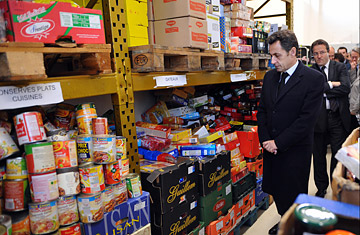
French President Nicolas Sarkozy at a grocery store
In policy terms, December, 2008 is not turning out to be a keeper for French President Nicolas Sarkozy. Less than 24 hours after his government was forced to delay much touted education reforms in the face of protests by high school students, Sarkozy was forced to make big concessions to plans to legalize Sunday trading in France. Far from the sweeping liberalization Sarkozy had called for as part of his plan to let French employees "work more to earn more", the compromise bill will modestly augment the number of exceptional Sundays shops are already permitted to open.
Parliament is scheduled to begin debating the bill today, more than a week later than intended. The reform would have overturned a 1906 law that sets aside Sunday for rest and allowed shops in France's largest cities to open as they wished. But it faced fierce opposition from both the left and right. Socialist legislators have already filed over 4,000 amendments to the draft law, while members of Sarkozy's own ruling conservative majority have used a mix of religious and familial concerns to oppose it. With the number of right-wing dissenters growing ever larger, Sarkozy was forced to cave and save what he could of his Sunday legislation. (Read Tony Blair's view of Sarkozy, a runner-up for TIME's Person of the Year.)
"We're no longer talking about a generalization of Sunday opening hours," crowed Marc Le Fur, a member of Sarkozy's conservative Union for a Popular Majority (UMP). "France and the French people remain fond of Sunday as a rest day. This text will conserve Sundays as a day of rest."
Opinion polls in France show that slightly more than half the population want shops to have the freedom to open on Sundays. But a powerful range of opponents combined against the idea. Leftist politicians and unions, for example, denounced the plan as introducing a seven-day work week. That, they say, would allow bosses to force workers to work Sundays — despite measures in the original bill that stipulated Sunday hours were both optional, and higher-paid. Conservatives, meantime, brushed off Sarkozy's assurances that the extra day of activity would boost France's economy, and focused on the fact that Sunday trading would deprive families, associations, and church groups the one day of free time people build their week around. (See pictures of Sarkozy and his wife in London.)
Realizing he would not win this battle, Sarkozy amended the proposal. It now calls for doubling the number of exceptions to Sunday closing rules per year from the current five to 10, not counting the period prior to Christmas. Even then, however, city councils must approve local extension of Sunday openings, a green light that may prove hard to obtain after the nation-wide romp the Socialists enjoyed in municipal elections last spring. "Don't bother voting this text, because it won't be applied," warned Socialist Party leader and mayor of Lille Martine Aubry. "We'll be as ferocious in battling this project as we were the initial one."
Perhaps. But the government still appoints regional prefects, and they wield veto power over how municipalities apply new laws. Sarkozy and Sunday-minded shop owners could yet have the last laugh yet.
